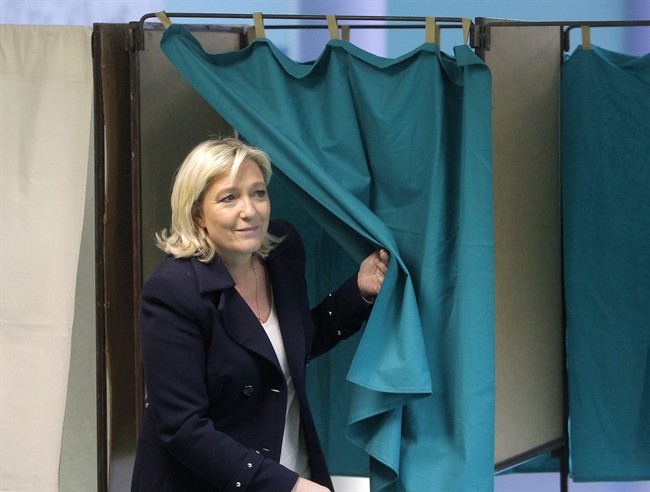PARIS – Marine Le Pen’s anti-immigration National Front was the front-runner heading into the decisive second round of French regional elections Sunday, and now it’s up to voters whether to hand the once-pariah party an unprecedented political victory.

Le Pen is riding high after extremist attacks and Europe’s migrant crisis, and the party came out on top in six of France’s 13 newly drawn regions a week ago. But polls suggest it may fail to translate that into wins in the second round.
Turnout figures were seven per cent higher than for the previous regional elections in 2010, with 50.4 per cent of those eligible to vote casting ballots by 5 p.m. (1600 GMT), three hours before polls close in big cities, according to the Interior Ministry. The second-round turnout at the same time five years ago was 43. 4 per cent.
READ MORE: Far right National Front dominates first round of French regional elections
Candidates have tried to lure to the ballot box the nearly 50 per cent of those who failed to vote in the Dec. 6 first round, because their votes could be decisive.
The once-powerful Socialist Party, which currently controls all but one of France’s regions, came in a poor third place in the first round and pulled out of key races in hopes of keeping the National Front from gaining power. Former President Nicolas Sarkozy’s party came in a strong second, and looks set to make substantial gains in Sunday’s runoff.
Winning control of any region would be unprecedented and a big boost for the National Front – and especially for Le Pen’s hopes for the presidency in 2017.
- Canada refused to repatriate woman from ISIS camp because she can’t be arrested: internal memo
- Spain’s PM considers resigning amid wife’s legal probe: ‘Is it all worth it?’
- Russia vetoes UN resolution to prevent nuclear arms race in space
- Is Trump immune in the 2020 election case? What to watch for during hearing
Le Pen cast her ballot in the northern city of Henin-Beaumont, one of 11 run by the National Front. The far-right leader denounced “this giant campaign of insults, slander, fear” by her rivals during a bitter campaign. Socialist Prime Minister Manuel Valls has called the National Front a “scam” that “fools the French” and a divisive party that could “lead to civil war.”
PARIS ATTACKS: Picking up the pieces one month later
The northern region where Le Pen is running is one of two where the governing Socialists ordered their candidates to withdraw and vote for the right to block Le Pen. Socialists also withdrew in a southern region where Le Pen’s popular niece, Marion Marechal-Le Pen, is running. The Socialist candidate refused to pull out in a third region, in the east, where the National Front’s No. 2, Florian Philippot, scored well.
Socialist President Francois Hollande voted in a polling station in his stronghold of Tulle in central France.
Le Pen and her niece enjoyed strong leads in races they are running in northern France and the region that includes Provence and the French Riviera.
But Le Pen faces a tough second-round race against conservative former Labor Minister Xavier Bertrand in the northern region of Nord-Pas de Calais-Picardie, and her niece Marechal-Le Pen faces a similar challenge in the Provence-Alpes-Cote d’Azur against conservative Nice Mayor Claude Estrosi.
The outcome in the Paris region, now controlled by the left, remains unclear. Valerie Pecresse, a minister under former conservative President Nicolas Sarkozy is in a tight race against Socialist speaker of the house Claude Bartolone.



Comments